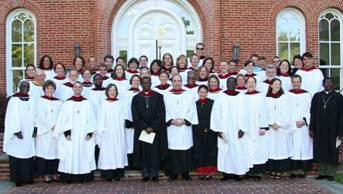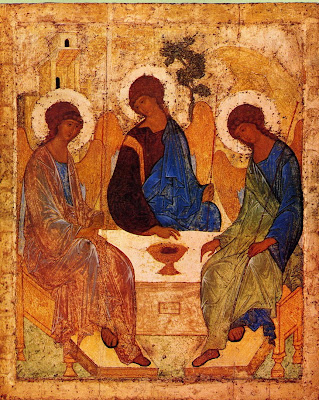
A Homily on Ecclesiastes 3:1, 9–13
Stephen L. Cook
Friday May 2, 2008, 6pm
“To everything (turn, turn, turn) / There is a season (turn, turn, turn) /And a time for every purpose, under heaven.” At first glance our text is encouraging. It is heartening to hear of a fitting order to things and to hear a witness that one may seize a propitious moment and get something meaningful accomplished. One might be tempted to preach an activist homily based on this text, one commissioning you all to go forth and change history. Perhaps I should sing to you that “I swear it’s not too late!” But not so fast…
Immediately after affirming “a time for every purpose under heaven,” our text moves us in a very different direction. It wonders out loud, rather skeptically in fact, whether human work at changing history really pays off, really produces results we can bank on. The wording of v. 9 calls the human person a “worker,” using the Hebrew verb עָשָׂה in a playful, satirical mode. As vv. 11 and 14 immediately affirm, the true “worker” (עֹושֶׂה) in history is God alone, who works the only real work: אֶת־הַמַּעֲשֶׂה אֲשֶׁר־עָשָׂה, to which nothing can really ever be added and nothing taken away.
Our text warns us not to go forth from this place expecting to make our mark and reap our reward; God’s achievements alone can be banked on! The masterful expositor Adam Welch saw this clearly. Dark forces beyond our control may limit our role. Even if God does end up using us in God’s macroscopic work, we may never actually see what our contribution ended up being. Reflecting on King Saul’s tragic life, Welch wrote:
If you would rightly estimate the situation of Saul and the reward and honour which are due to him, you must see it all in its Old Testament setting. We are biased in this matter of reward by our over-developed individualism in its dangerous weakness. We expect all reward to come to us personally in our own life-time, and we are apt to complain unduly if it does not come, so that we can savour it to the full. The Old Testament with its strong sense of the individual as but the creature of a day, who yet contributes his own act to the corporate body out of which he has come, who passes himself but who leaves his world richer by what he has sought to do for it, has a juster sense of what constitutes a due reward.
Fate too frequently hems us in, as it did King Saul. Even more challenging, God has apparently hard-wired us to block our initiatives at being of real utility to God. Verse 11 startles us with its claim that God has put עֹלָם into our minds. עֹלָם means “darkness.” The NRSV has missed the meaning of the Hebrew here, which is better captured by the NET: “[God] has also placed ignorance in the human heart so that people cannot discover what God has ordained.”
With עֹלָם stuck in our minds, we cannot help God steer history, assisting God in any really decisive way. Rather, God has ordained our ministry in the world to be downright ineffective and gratuitous. Wow! We must follow God’s leads in humble, dependent ignorance. We offer our service much as my two-year-old daughter Rebecca offers to help me set the table or feed Noah the cat. Her contribution adds nothing quantitative to the planning and execution of my chores, but oh how it modifies everything qualitatively. It fills my soul with joy! In his penetrating meditation on inutility, Jacques Ellul writes:
We are driven by the utility of the world and the importance of results. What counts is what may be seen, achievement, victory, whether it be over hunger or a political foe or what have you. What matters is that it be useful. … To want to attain results is necessarily not to be a witness to the free gift of God. If we are ready to be unworthy or unprofitable servants (although busy and active at the same time), then our works can truly redound to the glory of him who freely loved us first. God loved us because he is love and not to get results.
Our limitations and the finitude that we experience as a result of our God-imposed עֹלָם (“ignorance”) force us to accept our humanity. They aid us in cultivating a crucial reverent awe before God’s mystery. “God has so worked that all should stand in awe before him,” v. 14 affirms. And we cannot help but feel awe and excitement welling up within us when we concentrate on the sublime beauty of God’s times, seasons, and hidden purposes. They tower above us. It is too much, too wonderful for us—we cannot take it all in.
“Beauty”? Where does our text talk about “beauty”? Again, the NRSV of v. 11 does us something of a disservice with its lackluster phrasing about everything being “suitable for its time.” The Hebrew adjective is יָפֶה, meaning “fair,” “beautiful.” The NET translation gets it: “God has made everything fit beautifully.”
The יָפֶה of God–-God’s beauty reflected in life’s fittingness-–empowers our ministries in the world, our childlike ministries of gratuitous, free, ignorant immersion in God’s life. The feel of this beauty thrusts us into the divine life, impelling us to breathe it in deeply. The יָפֶה of God moves us away from a ministry oriented on utility and results into a ministry of vibrant, full, real living—of celebrating life. Better than most, Elaine Scarry in her book On Beauty and Being Just has observed just how beauty both confers life and provokes our embrace and protection of life. Scarry writes:
Beauty is for the beholder lifesaving or life-restoring—a visionary fragment of sturdy ground…. One’s daily unmindfulness of the aliveness of others is temporarily interrupted in the presence of a beautiful person, alerting us to the requirements placed on us by the aliveness of all persons, and the same may take place in the presence of a beautiful bird, mammal, fish, plant…. Beauty seems to place requirements on us for attending to the aliveness or (in the case of objects) quasi-aliveness of our world, and for entering into its protection.
We must find and serve God by seizing the heart-pounding life that is pulsing around us, ready to bring us joy. We must worry less about being judged based on our usefulness in God’s macroscopic work and more about being called to task based on our lack of deep joy in living. The Talmud warns that “in the world to come, each of us will be called to account for all the good things God put on earth which we refused to enjoy.”
We are often too slow to embrace God’s ordinary gifts of physical embodiment, and too quick to pursue another world. Dietrich Bonhoeffer came increasingly to realize the problem as he sat in his Nazi prison cell awaiting execution. In his Letters and Papers from Prison, Bonhoeffer wrote:
I believe that we ought to love and trust God in our lives, and in all the good things that he sends us…. To put it plainly, for a man in his wife’s arms to be hankering after the other world is, in mild terms, a piece of bad taste, and not God’s will. We ought to find and love God in what he actually gives us.
Bonhoeffer continues:
My thoughts and feelings seem to be getting more and more like those of the Old Testament, and in recent months I have been reading the Old Testament much more than the New…. It is only when one loves life and the earth so much that without them everything seems to be over that one may believe in the resurrection.
Verse 12 of our text from Ecclesiastes reads as follows: “I know that there is nothing better for people than to be happy and enjoy themselves as long as they live.” This proposal to seize embodied life makes strong sense in light of the fleetingness of all human accomplishments and the God-imposed ignorance which belies our delusions of utility. However, v. 12 may entail a more rigorous spiritual discipline than at first appears. As Ellen Davis writes, “Enjoying ourselves as long as we live (v. 12) is not a matter of good luck but a work of great delicacy and skill—that is, a dance.” It is not easy to yield “gracefully when familiar gifts are withdrawn and new ones, perhaps unwanted, are given.”
As you go forth from this place, let go of an orientation on achieving what is great and effective and instead pursue a ministry testifying to God’s prevenient grace, one expressing the gratuity of true love. Know that God has made everything beautiful in its time, which inspires us to loving acts that add simple beauty to life’s individual moments. The real ministries in this difficult life are those enacted through love and relationship, through art and creativity, through truly human living. Such ministries may modify nothing quantitatively, but they truly change everything qualitatively. Go forth to be happy and to enjoy, to eat and drink and take pleasure! Amen.








